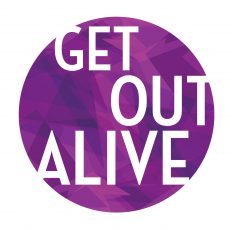by Nikki Lynette (Get Out Alive, Fest ’22)
@nikkilynette
Theatre is not going to save the world.
It’s not gonna fix the rift that has divided America so significantly that many of our friends and loved ones don’t feel safe in it. Theatre can’t fix what we didn’t break. But what theatre can do is be a vehicle for dialogue. It can offer different perspectives. At a time when we are a nation of people divided into echo chambers, theatre can platform tough conversations and give a voice to those who need to be heard.
If we let it, theatre can be the driving force behind the millions of people who will save the world.
It’s time for theatre to start calling in new audiences. I believe they’ve been waiting for us.
When I attended the Cove Park Musical Theatre Writing Residency earlier this year, I met a brilliant woman named Jeanie O’Hare. Until I met her, I’d never cared much about works that are considered the “classics” in theatre. I felt no connection to it. The 1978 film The Wiz is classic musical theatre to me. While leading a group session one day at the Scotland residency, Jeanie acknowledged that many new playwrights push back against the idea of studying old ones because they reject the idea that those writers should be the gold standard for new works. But Jeanie insisted we consider why the work of those writers was revolutionary during their time. I was surprised to learn that, back in the day, William Shakespeare was considered controversial! Partly because there were rumors that he had a ghostwriter, and partly because he ignored the traditional rules of theatre at the time. But a big reason Shakespeare’s work was controversial was because it allowed people to debate issues of their time without fear of offending others. He created opportunities for sharing ideas about politics, death, gender, sexuality and religion. And that made a lot of folks mad because they feared his work would be a “corrupting influence.”

I had no idea William was out here pissing people off! And just like that, I had a reason to get into Shakespeare.
It brought me a lot of comfort to learn that theatre has been used to disrupt norms for hundreds of years. If that’s common knowledge, then my apologies… but it’s news to me. I didn’t go to school for theatre, I don’t even have a college degree. I’m from the world of indie music, where you kinda have to learn on the job. Being featured at NAMT Festival in 2022 was, to me, the day I joined the theatre community.
My musical about depression, GET OUT ALIVE, ain’t exactly Shakespeare. I wrote it for people like me, and until NAMT, those are the only folks who had ever seen it. My book is full of culturally specific language. My songs aren’t musical theatre standards, they’re genre-blending bops. But my play did really well in front of the NAMT audience full of people who are nothing like me. It did so well that it led to me optioning my musical to a Broadway producer! I did a whole video series on Instagram explaining the trajectory of GET OUT ALIVE, and I assure you, nobody is more shocked by how this played out than me. Being embraced by the larger theater community made me think about the fact that theatre offers something really rare – we are giving people entertainment and connection at the same time.
View this post on Instagram
Do you know what mirror neurons are? They are nerve cells in our brain that allow us to process facial expressions and gestures so we can perceive and understand other people’s feelings without words. These neurons are being activated in theatre, in real time. Maybe that’s why traditional theatre audiences have been so loyal to the art form. It saddens me that we haven’t yet figured out, as a community, how to welcome new audiences. But while we twiddle our thumbs and wait for new folks to come to us, the music industry is normalizing the incorporation of theatrical elements into their stage shows. And the audiences are loving it.
These days, we have amazing artists like Beyoncé, Adele and The Weeknd working on their stage design with Es Devlin. We have rapper Kendrick Lamar incorporating the 4000-year-old art form of puppetry into The Big Steppers Tour. We have Joaquin Phoenix and Lady Gaga bringing The Joker to the big screen as a jukebox musical. Diverse audiences are engaging with theatre… just not always in theaterhouses. And when I ask my friends why they don’t see plays, they say it’s because they feel unwelcome there. They think it would be too “highbrow,” and “bougie,” which is often quite boring. They believe that theatre isn’t for them. And honestly, as a person who is very new to this space, I initially questioned my place in this community, too. Right up until Mara Isaacs sat me down and explained that me feeling like an outsider is exactly why I belong here.
If I had my way, theatre would be mounting new works as often as we are mounting revivals and adaptations of existing IPs. Somebody would find some money to hire one of these fancy New York marketing agencies to rebrand theatre as fun, fresh and accessible. They’d find a professional way to say “So what if theatre is bougie? Who doesn’t love a lil’ bourgeois moment? Pull up!” I want young folks to be able to go on affordable dates to see a play. I wanna see folks on social media dancing to our scores. I wanna see more stories being told by black people and other folks of color without them having to worry that a negative review from someone who holds the classics as their gold standard could kill their production.
Theatre is high art, and if millions of people are already engaging with it across multiple industries, then it only makes sense that we call in the folks who have an appetite for this work and do what it takes to keep them seated at the table. I see a lot of benefit to us embracing our commonalities right now. Putting on costumes and singing songs will not save the world. But, like playwrights before us, we can bring a group of people into a room and share ideas about politics, death, gender, sexuality or religion in an artful, nuanced way. That just might be the most valuable thing theatremakers can offer the world right now.
GET OUT ALIVE appeared in the 34th Annual Festival of New Musicals.
Book & Lyrics
Nikki Lynette
Music
Nikki Lynette, Matt Hennessy, Clay Bail, Malcolm Fong, Slavic Livins, and Zeke Macumber



